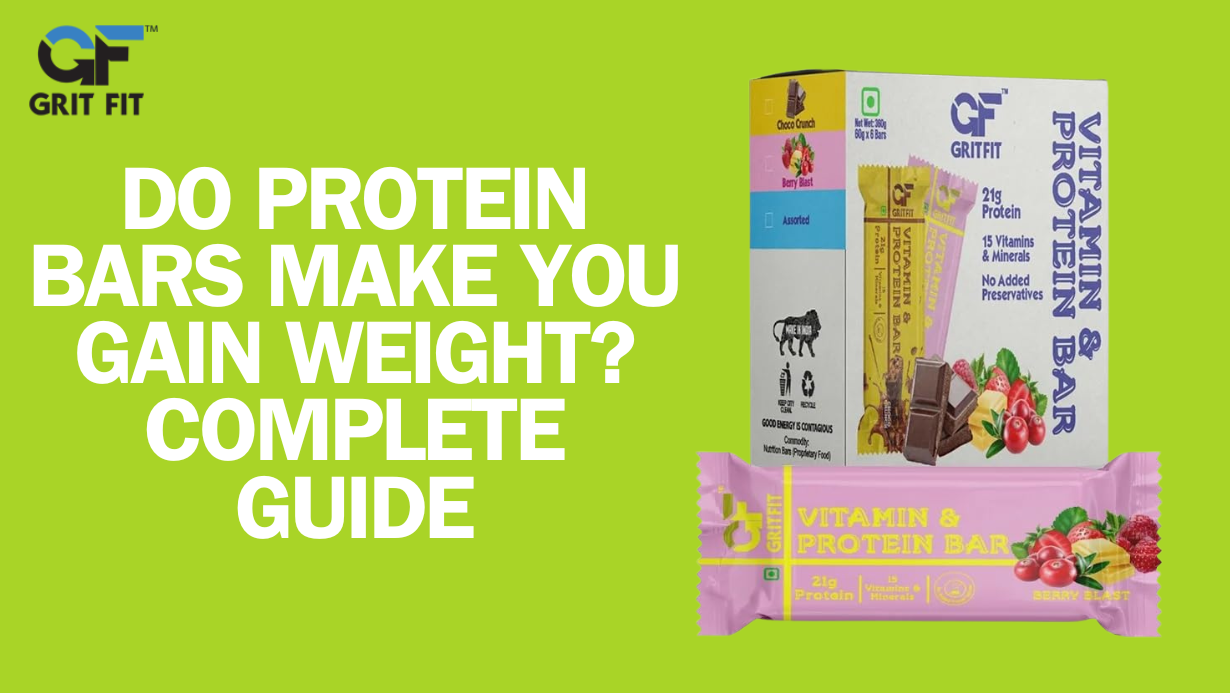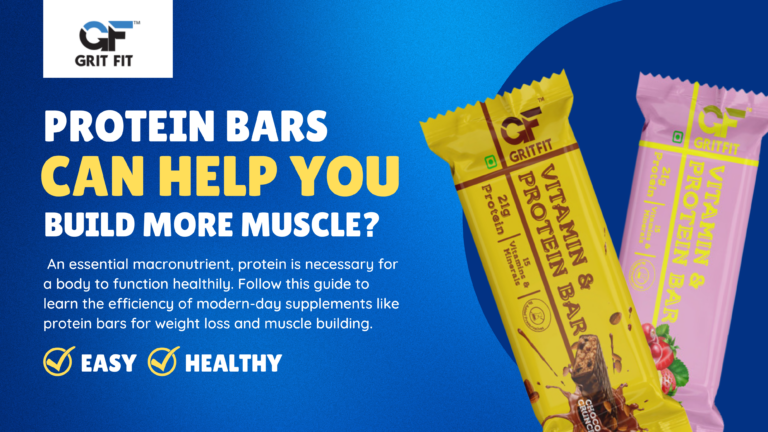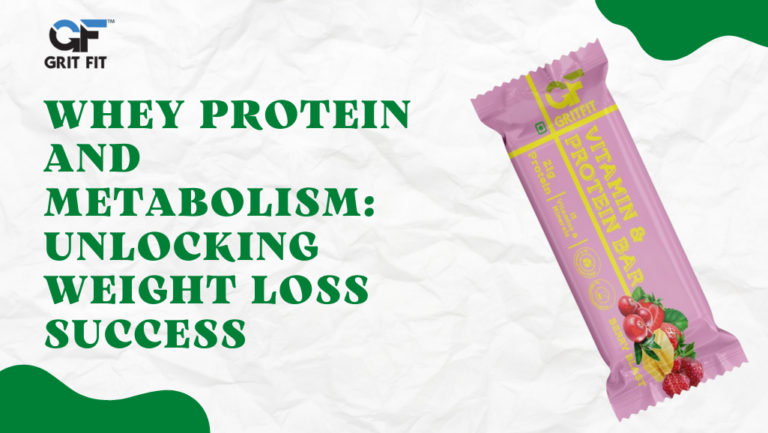Summary: In this blog, we’ll discuss the role played by protein bars in weight management and how you can control the same according to your needs.
Key Takeaways:
- Protein bars are calorie-dense food supplements. So, they can lead to weight gain if consumed in excess.
- Reading the label can really help you to properly integrate protein bars into your diet without adding to your daily calorie intake.
- Protein bars alone can’t provide you with all the necessary nutrients that too in the right quantity. Ultimately, you have to rely on a well-balanced diet for overall nutrient supply.
Protein bars are widely used in the fitness and nutrition industries. They are frequently praised for their protein content and ease of use, making them an alluring grab-and-go choice. However, there is still one unanswered question: Do protein bars really make you gain weight? Like most things related to health and well-being, the answer is complex.
Let’s investigate the variables that affect your waist size as we go deeper into the science of protein bars and weight gain.
Understanding Calories
To gain weight, you need to compare the number of calories you eat to the number of calories you burn. Think of your body as a high-tech battery. When you eat or drink something, your body turns it into calories. These calories are the fuel it needs to do everything, like keep your heart moving and keep your brain working.
People who regularly eat more calories than they burn through daily tasks and exercise are said to have “excess energy.” This extra energy doesn’t just go away; your body saves it smartly for later use, mostly as fat. Over time, this buildup of saved energy makes you gain weight.
So, how do protein bars fit into all of this? But they don’t automatically make you gain weight. How they affect your weight depends on how many calories they make up of your general diet. Just like any other food, think of protein bars as concentrated sources of energy. Therefore, one can also use protein bars for weight gain.
If you plan how to include them in your daily calorie intake, they can be very helpful. However, protein bars are no different from other calorie-dense foods. While they offer convenience and benefits, consuming them mindlessly and exceeding your daily calorie needs can lead to weight gain.
Here’s how to use this knowledge to make smart eating happen:
- Keep Track of Your Calories: The first step is to know how many calories you need each day. There are various online tools and mobile apps that can help you figure out your basal metabolic rate (BMR). Your BMR is the number of calories your body burns when it is at rest. This gives you an accurate idea of how many calories you need each day.
- Factor in Protein Bars: Once you’ve determined your daily calorie allowance, take the next step of understanding the calorie content of your preferred protein bars. On the package of most protein bars, it’s easy to see how many calories are in each dose. This lets you make the necessary changes to your other meals and snacks to stay within your calorie limit.
- Mindful Snacking: Watch how much you eat. Single bars may seem like a good idea, but some of them can be very high in calories. Moreover, follow the serving size guidelines, and don’t eat a bunch of bars without thinking throughout the day.
Making Protein Bars Work for You
If you want to make sure that protein bars help you reach your weight loss goals, here are some important things you can do:
Become a Label Detective
Don’t let marketing claims make you lose your mind. Make it a habit to read the nutrition info and ingredients list on every protein bar you buy. Thus giving you the power to make smart decisions. Here’s what to pay close attention to:
- Calories Content: Find out how many calories are in each amount. This is important to know if you want to figure out how the bar fits into your daily calorie limit.
- Protein Content: To help you feel full and curb cravings, look for bars with a moderate to high protein content. Ideally, these bars should offer 10 to 20 grams of protein per serving.
- Fiber Content: Look for bars that have a modest amount of fiber (about 3–5 grams per serve) to help your digestion. Also, this will help you feel fuller for a longer period of time.
- Sweeteners: While some protein bars might boast a tempting sweetness, the type of sweetener used can significantly impact your health goals. Ideally, choose bars with little to no added sugar. If some sweetness is desired, opt for bars sweetened with natural ingredients like stevia or monk fruit extract. These natural sweeteners provide a touch of sweetness without the drawbacks of added sugar. However, be mindful of sugar alcohol, another common sweetener in protein bars. While sugar alcohols offer minimal calories and don’t significantly impact blood sugar, they can cause digestive discomfort in some individuals. So, prioritize natural sweeteners and proceed with caution regarding sugar alcohols.
Controlling Portions is Very Important
Protein bars that look healthy can still have a lot of calories. If a bar claims to help you lose weight, that doesn’t mean you can eat too much of it. Furthermore, here’s how to make sure you control your portions:
- Stick to the Serving Size: Pay close attention to the serving size suggestion on the package. Don’t eat the whole bar if the serving size says to eat half of it.
- Pre-Portion Your Snacks: If you find yourself reaching for multiple protein bars throughout the day, consider pre-portioning them into individual bags. This simple step can help curb mindless snacking and ensure you stick to the recommended serving size.
Matching Your Need
Not all protein bars are the same. When picking a bar, think about what you need:
- Post-Workout Fuel: When you work out, your muscles need protein to repair and rebuild. Therefore, choose bars that are made with more protein (about 20 to 30 grams). Also, ensure that the bar has some carbs to help your body rebuild energy stores.
- Quick Snack: For a quick protein boost between meals, prioritize bars with a moderate protein content (around 10-15 grams). This protein content, combined with fiber, will help you feel full and manage cravings throughout the day.
Integration, Not Replacement
When it comes to protein, protein bars are convenient, but they shouldn’t be your only source of protein. A balanced diet full of whole foods like fish, eggs, lean meats, beans, and cheese should be your top priority. You shouldn’t eat protein bars instead of a healthy, well-balanced meal that gives you all the essential nutrients you need.
Conclusion
You won’t gain weight just because you eat protein bars. However, if you’re on a high-calorie diet, you can eat protein bars for weight gain. To avoid gaining weight, either choose a protein bar with fewer calories or stop eating them altogether. Furthermore, you can change other parts of your diet to make room for protein bars.
If you are a fan of peanuts, you can try GritFit’s Dry Fruit Bars to get the benefits of peanuts’ protein.
FAQs
What should I look for in a protein bar if I want to avoid weight gain?
Choose protein bars that have a balanced macronutrient makeup, which means they have a normal amount of calories, little extra sugar, and healthy fats.
Should I eat protein bars before or after a workout to help weight loss?
Eating a protein bar before or after a workout can help your muscles heal. But how it affects your weight loss will depend on what you eat and how often you work out.
Can Protein Bars Replace Meals?
Since protein bars typically lack the vitamins and minerals that make up a full meal, they shouldn’t be used as a substitute for meals.
Why Are Protein Bars So High In Calories?
Because they contain protein, good fats, and carbs, protein bars are rich in calories. These bars are a practical choice for athletes and those on the go since they are made to deliver nutrients and energy quickly.







